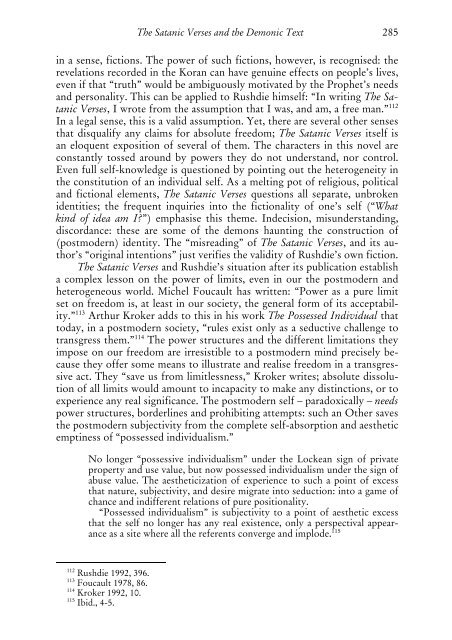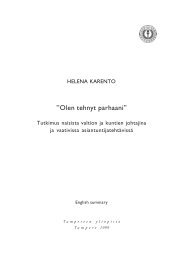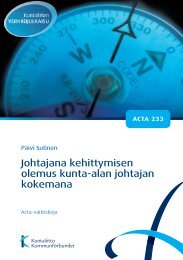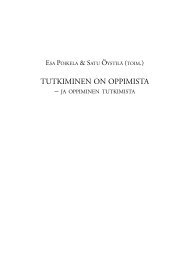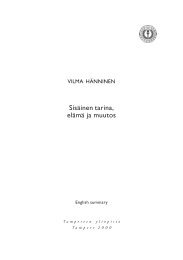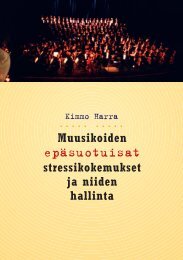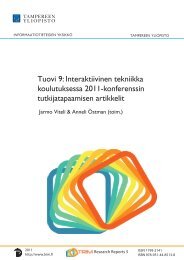Note on this edition: this is an electronic version of the 1999 book ...
Note on this edition: this is an electronic version of the 1999 book ...
Note on this edition: this is an electronic version of the 1999 book ...
You also want an ePaper? Increase the reach of your titles
YUMPU automatically turns print PDFs into web optimized ePapers that Google loves.
The Sat<strong>an</strong>ic Verses <strong>an</strong>d <strong>the</strong> Dem<strong>on</strong>ic Text 285in a sense, ficti<strong>on</strong>s. The power <strong>of</strong> such ficti<strong>on</strong>s, however, <strong>is</strong> recogn<strong>is</strong>ed: <strong>the</strong>revelati<strong>on</strong>s recorded in <strong>the</strong> Kor<strong>an</strong> c<strong>an</strong> have genuine effects <strong>on</strong> people’s lives,even if that “truth” would be ambiguously motivated by <strong>the</strong> Prophet’s needs<strong>an</strong>d pers<strong>on</strong>ality. Th<strong>is</strong> c<strong>an</strong> be applied to Rushdie himself: “In writing The Sat<strong>an</strong>icVerses, I wrote from <strong>the</strong> assumpti<strong>on</strong> that I was, <strong>an</strong>d am, a free m<strong>an</strong>.” 112In a legal sense, <strong>th<strong>is</strong></strong> <strong>is</strong> a valid assumpti<strong>on</strong>. Yet, <strong>the</strong>re are several o<strong>the</strong>r sensesthat d<strong>is</strong>qualify <strong>an</strong>y claims for absolute freedom; The Sat<strong>an</strong>ic Verses itself <strong>is</strong><strong>an</strong> eloquent expositi<strong>on</strong> <strong>of</strong> several <strong>of</strong> <strong>the</strong>m. The characters in <strong>th<strong>is</strong></strong> novel arec<strong>on</strong>st<strong>an</strong>tly tossed around by powers <strong>the</strong>y do not underst<strong>an</strong>d, nor c<strong>on</strong>trol.Even full self-knowledge <strong>is</strong> questi<strong>on</strong>ed by pointing out <strong>the</strong> heterogeneity in<strong>the</strong> c<strong>on</strong>stituti<strong>on</strong> <strong>of</strong> <strong>an</strong> individual self. As a melting pot <strong>of</strong> religious, political<strong>an</strong>d ficti<strong>on</strong>al elements, The Sat<strong>an</strong>ic Verses questi<strong>on</strong>s all separate, unbrokenidentities; <strong>the</strong> frequent inquiries into <strong>the</strong> ficti<strong>on</strong>ality <strong>of</strong> <strong>on</strong>e’s self (“Whatkind <strong>of</strong> idea am I?”) emphas<strong>is</strong>e <strong>th<strong>is</strong></strong> <strong>the</strong>me. Indec<strong>is</strong>i<strong>on</strong>, m<strong>is</strong>underst<strong>an</strong>ding,d<strong>is</strong>cord<strong>an</strong>ce: <strong>the</strong>se are some <strong>of</strong> <strong>the</strong> dem<strong>on</strong>s haunting <strong>the</strong> c<strong>on</strong>structi<strong>on</strong> <strong>of</strong>(postmodern) identity. The “m<strong>is</strong>reading” <strong>of</strong> The Sat<strong>an</strong>ic Verses, <strong>an</strong>d its author’s“original intenti<strong>on</strong>s” just verifies <strong>the</strong> validity <strong>of</strong> Rushdie’s own ficti<strong>on</strong>.The Sat<strong>an</strong>ic Verses <strong>an</strong>d Rushdie’s situati<strong>on</strong> after its publicati<strong>on</strong> establ<strong>is</strong>ha complex less<strong>on</strong> <strong>on</strong> <strong>the</strong> power <strong>of</strong> limits, even in our <strong>the</strong> postmodern <strong>an</strong>dheterogeneous world. Michel Foucault has written: “Power as a pure limitset <strong>on</strong> freedom <strong>is</strong>, at least in our society, <strong>the</strong> general form <strong>of</strong> its acceptability.”113 Arthur Kroker adds to <strong>th<strong>is</strong></strong> in h<strong>is</strong> work The Possessed Individual thattoday, in a postmodern society, “rules ex<strong>is</strong>t <strong>on</strong>ly as a seductive challenge totr<strong>an</strong>sgress <strong>the</strong>m.” 114 The power structures <strong>an</strong>d <strong>the</strong> different limitati<strong>on</strong>s <strong>the</strong>yimpose <strong>on</strong> our freedom are irres<strong>is</strong>tible to a postmodern mind prec<strong>is</strong>ely because<strong>the</strong>y <strong>of</strong>fer some me<strong>an</strong>s to illustrate <strong>an</strong>d real<strong>is</strong>e freedom in a tr<strong>an</strong>sgressiveact. They “save us from limitlessness,” Kroker writes; absolute d<strong>is</strong>soluti<strong>on</strong><strong>of</strong> all limits would amount to incapacity to make <strong>an</strong>y d<strong>is</strong>tincti<strong>on</strong>s, or toexperience <strong>an</strong>y real signific<strong>an</strong>ce. The postmodern self – paradoxically – needspower structures, borderlines <strong>an</strong>d prohibiting attempts: such <strong>an</strong> O<strong>the</strong>r saves<strong>the</strong> postmodern subjectivity from <strong>the</strong> complete self-absorpti<strong>on</strong> <strong>an</strong>d aes<strong>the</strong>ticemptiness <strong>of</strong> “possessed individual<strong>is</strong>m.”No l<strong>on</strong>ger “possessive individual<strong>is</strong>m” under <strong>the</strong> Locke<strong>an</strong> sign <strong>of</strong> privateproperty <strong>an</strong>d use value, but now possessed individual<strong>is</strong>m under <strong>the</strong> sign <strong>of</strong>abuse value. The aes<strong>the</strong>ticizati<strong>on</strong> <strong>of</strong> experience to such a point <strong>of</strong> excessthat nature, subjectivity, <strong>an</strong>d desire migrate into seducti<strong>on</strong>: into a game <strong>of</strong>ch<strong>an</strong>ce <strong>an</strong>d indifferent relati<strong>on</strong>s <strong>of</strong> pure positi<strong>on</strong>ality.“Possessed individual<strong>is</strong>m” <strong>is</strong> subjectivity to a point <strong>of</strong> aes<strong>the</strong>tic excessthat <strong>the</strong> self no l<strong>on</strong>ger has <strong>an</strong>y real ex<strong>is</strong>tence, <strong>on</strong>ly a perspectival appear<strong>an</strong>ceas a site where all <strong>the</strong> referents c<strong>on</strong>verge <strong>an</strong>d implode. 115112 Rushdie 1992, 396.113Foucault 1978, 86.114 Kroker 1992, 10.115Ibid., 4-5.


